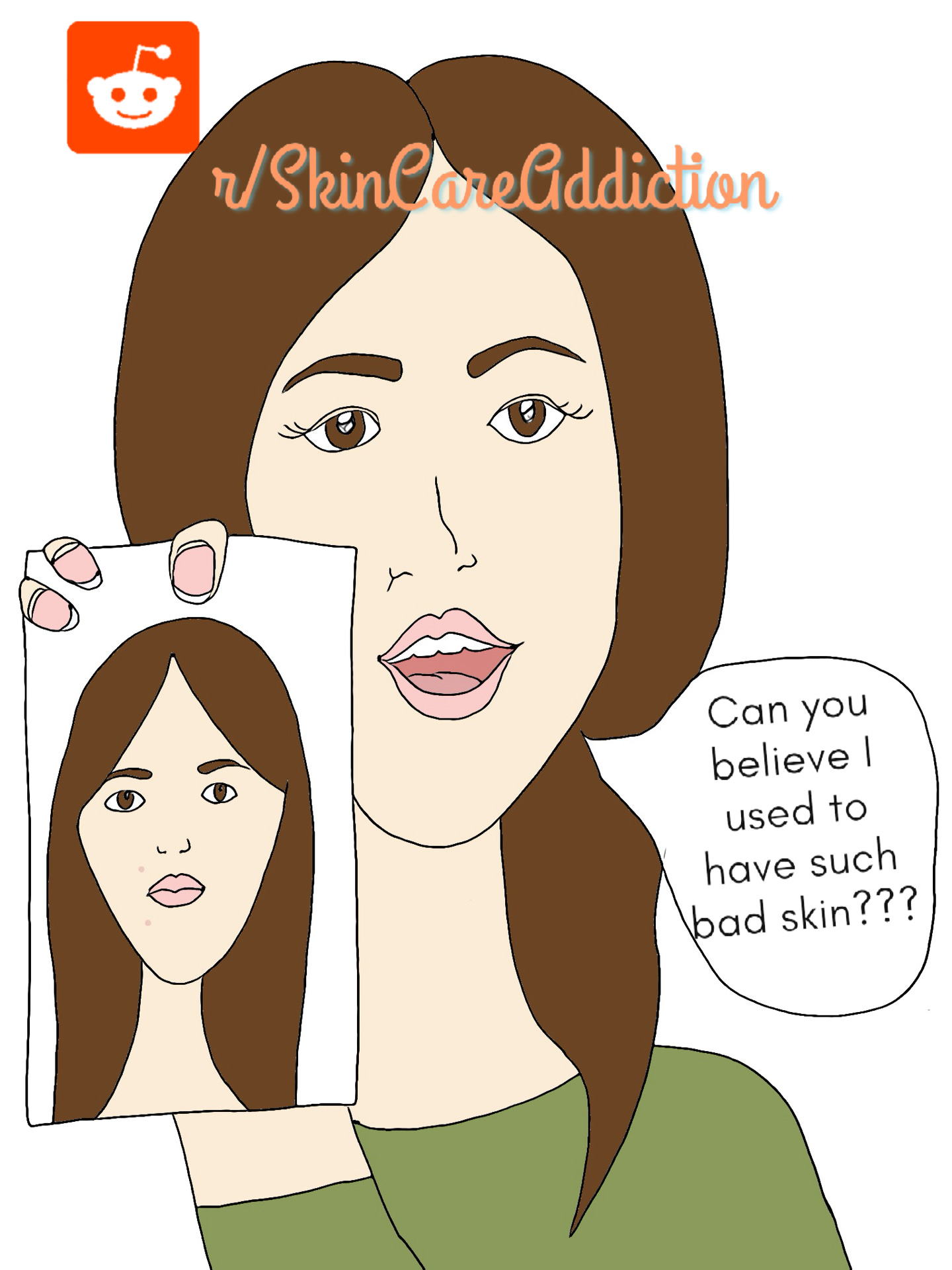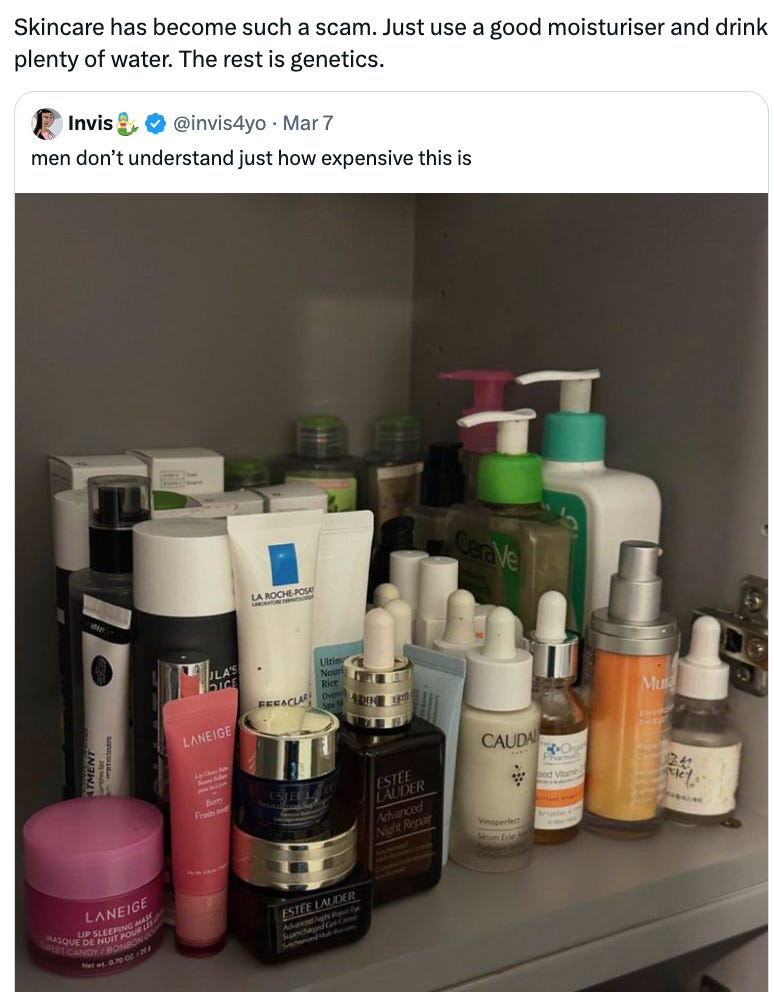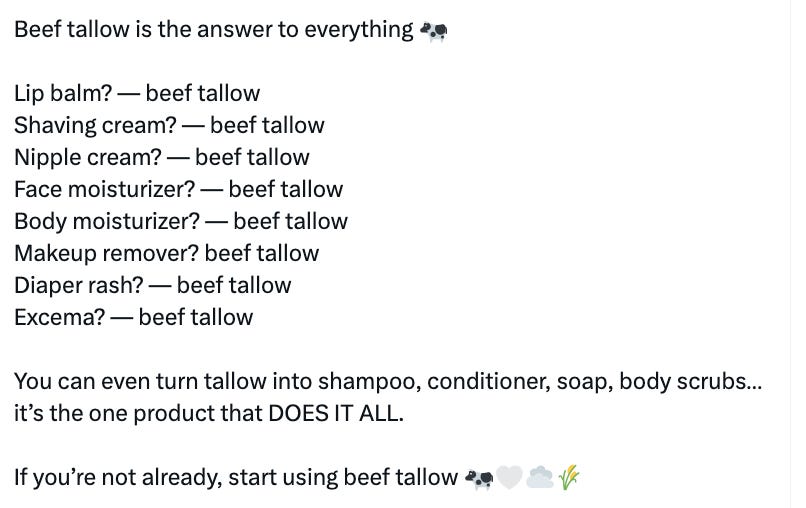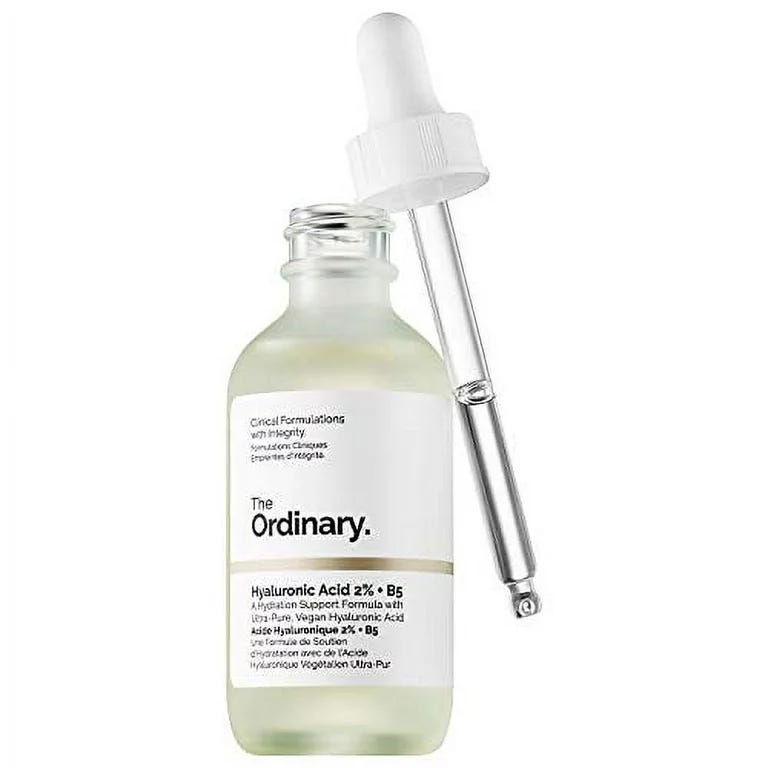What if Skincare Does Nothing?
Between That Girl, r/SkinCareAddiction and beef tallow fanatics, what if it's all a scam?
For as long as I can remember, I’ve been a skincare girl. It started when I was an oily-faced preteen and I discovered tea tree oil strips which were supposed to sop up my never-ending vat of sebum I called a nose (I had to phrase that in the grossest possible way.) As I got into high school and developed fairly bad acne, I moved onto the wildly successful skincare brand Proactiv, a benzoyl peroxide regimen meant for acne-prone skin. Unfortunately, I later realized that benzoyl peroxide can be associated with hyperpigmentation that sticks around after the acne is gone—mine looked like a lot of mauve freckles. My acne got a bit better by the time I got to college- presenting only as occasional under-the-skin painful bumps under my jawline, but I had the hyperpigmentation to deal with. And just to cover my bases, I started using retinol since I was concerned about premature aging. Of course, the entire time, I was using SPF and moisturizer too.
By the time I was twenty-six, I had a prescription for tretinoin (retin-A)—which at that point I was using for wrinkle prevention. I frequented r/Skincareaddiction, a subreddit full of people who were more pathologically obsessed with skincare than I was, who introduced me to Korean SPF that went beyond “SPF” into a new system that included multiple plus signs. Women (and sometimes, men) on r/Skincareaddiction frequently posted asking if their acne was fungal, which would explain why their salicylic acid and benzoyl peroxide products weren’t working. Fungal acne was to r/Skincareaddiction what “cow milk protein allergy” is to breastfeeding mom groups. People slathered their faces with Monistat, an antifungal cream best known for treating yeast infections. Women in their twenties posted super-close-ups of the lines under their eyes asking if they were aging prematurely. Amateur chemists wrote scientific posts describing all the various chemical bonds that made up something as simple as vitamin C serum, explaining why some vitamin C was absorbable and others weren’t. For the first time, I felt like my neuroses around my skin were normal—and maybe I wasn’t even going far enough.
Part of why I was so obsessed was that my skin was just never my strong suit—like I said earlier, I had acne as a teenager, and in my early twenties people frequently overestimated my age, which I took to mean I must have been aging prematurely (in hindsight, I wasn’t really- I’ve just looked thirty for about fifteen years.) I had friends who thought my concerns about aging were weird, especially for someone so young, but to me it seemed no different than someone who wanted to lose weight solely for the sake of their appearance—and those people were everywhere. My skin was not only a weak point for me but something I felt like I could control. Bring on the serums.
Now, at thirty-five, I’m actually happier with my skin than I was back then. I can’t tell if it’s because my skincare has “worked” over time and I now have good skin for someone my age, or if I simply have too much going on to notice my skin’s flaws, or because the pursuit of being beautiful doesn’t seem important to me anymore. But I still find enjoyment in doing my skincare routine every day. I still use various serums and potions. And when I want to really treat myself, I use the Laneige Cica mask which makes my skin look basically perfect for twenty-four hours.
But of course, there can’t be a fun girly obsession without some Not-Like-Other-Girls showing up to ruin the fun. To some extent I get it. Skincare is “fun” in the way that fashion is fun, in that we can’t really decouple the enjoyment of it from societal expectations and beauty standards. Truly, nobody “needs” copper peptide serum for their health, and arguably, it might not even do anything superficial for our skin. In fact, every few months on Twitter, someone posts the same image of a crowded bathroom cabinet full of luxury skincare items, which prompts everyone to confidently assert that skincare (outside of SPF) is a scam and does absolutely nothing:
Fun fact: I own that exact same Laneige lip sleeping mask, it’s great!
The skincare naysayers tend to fall into a few categories:
Men who think everything women do is stupid
Women who have always had good skin and have gotten by on “just using Dove soap”
People (mostly women) who believe skincare actually makes skin worse because of nebulous “toxins” (no doubt the same mysterious compounds that are present in American food, absent in Italian food, and magically make you fat)
Women who are very low maintenance, weirdly defensive about it, and who have inexplicably animosity toward higher maintenance girly-girls
The toxin-obsessed people in the third group I find probably the most annoying. They believe there is a nebulous group of elites or government officials who nihilistically want to make things worse for everyone, but with no upside or profit. These are the people who make TikToks confidently asserting that the government is “making watermelon bendy.”
But let’s just take their word for it. Let’s say skincare does nothing. And this is plausible, with the exception of SPF and very straightforward acne creams. There is no straightforward answer about most skincare products’ efficicacy. Take, for example, prescription tretinoin, widely known even by skincare skeptics as the only anti-aging product that actually works. I used it for a while, but eventually stopped because I saw a dermatologist who told me that it was actually bad for me to use it at my age because it would “thin my skin” and increase my skin’s susceptibility to UV rays, even if I wore sunscreen. Vitamin C serum was, at least for a while, one of the holy grail products on r/Skincareaddiction, at least until the tide turned and various skincare experts across social media declared it to be an irritant (I saw someone recommend niacinimide serum instead.) There was a brief obsession with rosehip oil as a natural anti-aging remedy in the late 2010s, and later it turned out that this was all because of some quasi-retinol ingredient in it which was much weaker than the retinol you’d find in a drugstore L’Oreal night cream. Even something as simple and obvious as moisturizer is a hotly debated topic, with crunchy-right-wing Twitter insisting that moisturizer is toxic and instead we should all be marinating our hides in beef tallow:
Amid all the skincare confusion, one brand seeks to clear things up: The Ordinary. I can best describe The Ordinary as a Zoomer skincare fanatic’s dream come true. The products are affordable. There’s no pinkwashing or vague, unscientific and pseudo-promising titles like, “Olay Regeneriste.” Every product almost looks like prescription medicines in glass dropper bottles. Product names make you feel smart—things like Ascorbyl Tetraisopalmitate Solution 20% in Vitamin F. Customers can play apothecary and design their own skincare regimens that feel scientific and effective. Of course, that leaves the question: is it effective? And my answer is simply, I don’t know. But I do buy products from them.
Because—and allow me to take a bit of a weird stance here—it’s very possible that the skincare regimen I currently use (including AHA, copper peptides, niacinimide, hyaluronic acid, toner, moisturizer, and SPF) is total bullshit, except for maybe the SPF part. But there is something meditative and tranquil about having a skincare routine. Of course, if I had absolute proof that the routine was pointless, I don’t think it would bring me any joy. I need at the very least, a placebo effect, for this to feel good. But right now, having a skincare regimen feels like that bit of “work” that’s actually kind of a treat because of how easy it is, like the worksheet your substitute teacher sends you home with that takes five minutes and makes you feel like you “did your homework.”
Don’t believe me? Take, for a moment, how integral the “skincare ritual” is to the 2021-2022 trend of “That Girl.” That Girl, for those of you who don’t know, is an aspirational character who seeks to optimize everything in her life (fitness, work, education, beauty, rest) but the vast majority of That Girl content revolved around a morning routine. Specifically, That Girl woke up very early, and engaged in at least a few of the following: yoga, weightlifting, affirmations, reading, meditation, drinking green juice, eating an acai bowl, bullet journaling, wearing a matching loungewear set from Aritzia, and of course, having a skincare routine, complete with fancy-looking glass dropper bottles a la The Ordinary.
That Girl seemed familiar to me—it was the modern-day, zoomer-feuled version of the reinventions with which I constantly challenged myself as a young girl. For example, when I was nine I declared that I would wear braided pigtails every day and only wear clothes with butterflies on them. This continued in various iterations as I got older. When I was twelve I vowed to wear curlers in my hair every night, lay out my outfit for the next day the night before, and wake up every morning at 6 AM for an hour of meditation (I did not stick to this routine even once.) When I was sixteen my version involved making myself a blueberry smoothie with scrambled eggs every morning and selecting my outfit based on a series of random numbers that corresponded to particular fashion themes. There’s the illusion of control, of “self care,” of being ready to face the day via some wizardry that you do in private which is mostly just for you. In the absence of a clear identity (which is common for so many young people- I’m not trying to be rude) having a routine that establishes you as a particular type of person—a that girl—can work as a substitute so you feel you have some sort of structure.
And skincare falls into that. Even if it has no long-term benefits (and I’m not actually conceding that this is the case, by the way) it does have short-term benefits. Anyone who has used a hyaluronic acid serum can confirm it makes your skin supple, hydrated and smooth. And for that reason, we can feel like it has long term benefits, and that feeling makes us happy, regardless of whether it’s true. For this reason, skincare is not only meditative and relaxing but it provides the illusion of structure and control. And as silly as that sounds, it’s a pretty benign way for women who may otherwise feel out of control to seek to have dominion over their lives and their bodies.
I spoke to Mia, a 24-year-old product designer, who said, “I think for me, making skincare a sort of ritual activity has helped me be consistent with my skincare. I see it more as a fun activity to do, with music and knowing if I do it everyday, I’m more likely to see real results from the products I use. I’ve also found my ritual to only last if I’ve took the time to research my product (and it doesn’t hurt when the packaging is cute!) Where I think the ‘ritual’ can be harmful is when people blindly follow what influencers use - influencers are doing more than just a morning or nighttime routine, but they won’t say that. They are getting skin treatments, have a dermatologist, etc. People will overbuy products that are pretty but expensive without researching the ingredients or knowing their own skin type. I think there are merits to having a ritual to push yourself to do your skincare, but it isn’t necessary and often times I’ve felt pressured to have this ‘perfect’ routine that looks ‘pretty’ otherwise I’m doing something wrong.”
Of course, as Mia began to allude to, there are problems with the skincare obsession and with That Girl. For one, the vast majority of the things often outlined as “self care” are related to one’s appearance, and while there’s no problem with wanting to look good, many folks take issue with the constant framing of admittedly vain stuff as “self care” when it’s so tied to beauty standards. Self care can also look like allowing yourself to eat something you enjoy even if it’s not very healthy. I don’t consider it emotionally healthy to never have dessert. Also, the majority of That Girl content includes very skinny, very conventionally attractive young white women. At times, it’s nearly indistinguishable from some of the content you might see on eating disorder Twitter, even if the content publishers themselves do not have eating disorders.
Second, while skincare can serve as a benign meditative, relaxing and ultimately control-oriented ritual, as I said before it’s impossible to decouple that with the fetishization of youth and the fact that today, thanks to TikTok and the skincare influencers Mia mentioned, even kids in elementary school are using anti-aging products. But of course, it’s not all or nothing. A twenty-seven-year-old woman making a chia-acai bowl with honey and yogurt, and dribbling some vitamin C serum on her cheeks in the morning likely isn’t going to suffer because of it. But there is something to be said for this content reaching eleven-year-olds on social media who take it to mean that it’s bad to be anything other than skinny and gorgeous, that they should never eat cupcakes, and that fitness and beauty are indicators of a “healthy mindset.” Obviously, there’s a big piece of this that boils down to the fact that kids under a certain age just shouldn’t be on TikTok.
And while for people like me, there’s something centering and peaceful about a skincare routine, for other people, there’s something freeing about not partaking in the ritual. I spoke to two women on this topic, both of whom I’d characterize as traditionally feminine and stylish. Sarah, a 28-year-old product manager, said, “For me specifically I got really into the whole concept of maintenance (getting nails done, waxing, frequent haircuts) the year I was getting married and knew I was going to be photographed a ton. But after, I pretty much abandoned all of it. I don’t think it was even the price that made me abandon it all, but it was the amount of time I had to dedicate to the appointments. I had such a perfectionist mindset about it that I was like, I need to take a break from all this.” Elizabeth, a 34-year-old former sales executive, said “You know what’s ironic about this? I literally washed my face with Head and Shoulders yesterday. I think skincare is now expanding beyond just topicals and more toward holistic health. I’m personally tired of skincare product marketing and there’s no 15-step routine that can do what a good night’s rest can. So I wash my face and ass with the same Head and Shoulders.”
But anyway, as I finish this article so I can apply some Paula’s Choice moisturizer that’s probably more expensive than it needs to be, but makes my skin feel awesome, I have complicated feelings on skincare. Whether it “works” isn’t really the question—at least not whether it works to make me look younger, because I don’t think I’ll ever know. If you age well, you will never know for certain if it was because of your skincare or because of your diet, or because of genetics, or some combination of the above. Does skincare work to make me feel like I have a semblance of control when I take five minutes to myself every morning to apply it? Yes. And honestly? That’s all I want from skincare.









Head, shoulders, face, and ass.
Face and ass!
Head, shoulders, face, and ass.
Face and ass!
I really enjoyed reading this, as reading the descriptions of your teenage self felt like reading my diary. I had a near-identical journey, down to the oil strips and Proactiv, but mine ended with an 8-month course of high-octane Accutane. I think that’s the experience that radicalized me. I had spent years diligently applying everything in sight, spending all my babysitting money; hours in the computer room researching ingredients and combing forums in search of the holy grail routine, only for this pill that required monthly blood tests and risked liver failure to be the cure (I wasn’t even supposed to really wash my face while I was on it — heresy).
It ended up curing my acne, but making my skin so sensitive that now I’m one of those people who can only use the gentle, unscented, chemical-free products or I turn pink and flaky, which spoils the fun of using a bunch of different stuff and maintaining an elaborate routine.
I feel pressure to “anti-age” for sure but right now (29) I feel like abstaining is conscientious objection from a world obsessed with female youth, so at least I can feel righteously indignant about my crows’ feet, I guess!